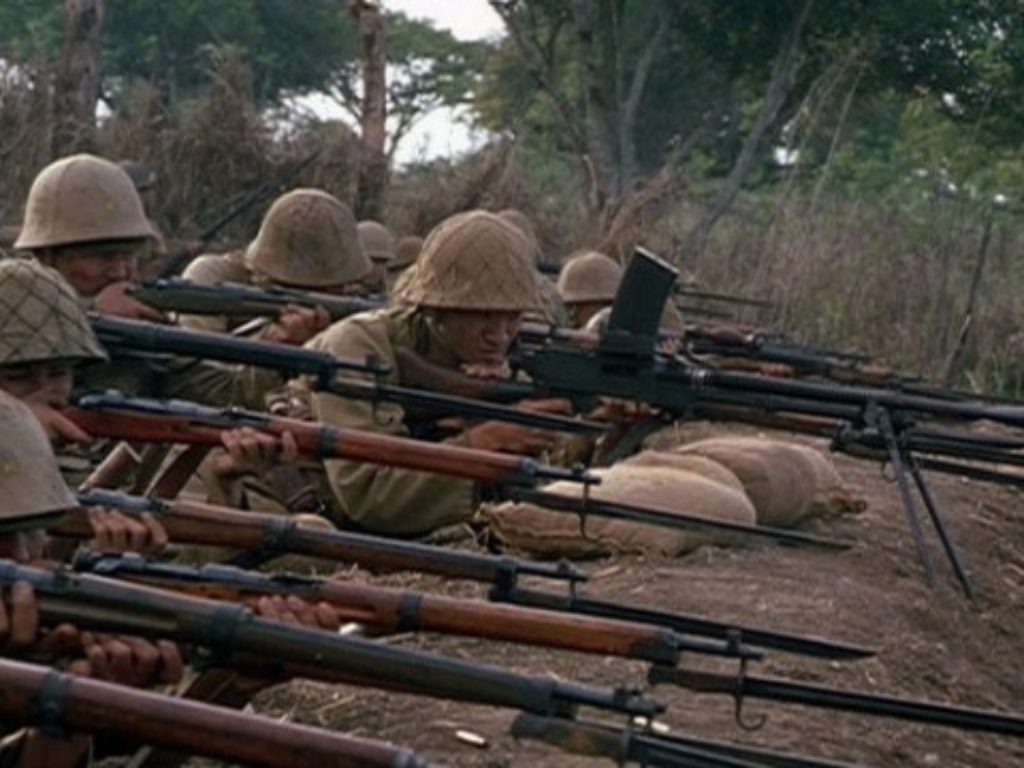
The WWII Navajo code talkers were so top-secret, their very existence wasn’t declassified until decades after the war. The code they created is now widely credited for the Allied success in the South Pacific—it was never broken. And none of the code talkers were ever captured by the enemy. . . .
It’s at this point that John Woo’s Windtalkers departs from history and begins to imagine what might have happened if one (or more) of those recently-decorated Navajos had been captured by the Japanese. What might have their bodyguards done? The handpicked Marines guarding the code talkers were instructed to protect the code, even if that meant killing the men who knew it. Joe Enders, therefore, has no intention of getting friendly with his code talker, Ben Yahzee. But the cruelty of war, long marches across desolate land and the close confines of military life forcibly bond the two men, making Enders’ assigned task all the more difficult. If the big moment arrives, will he pull the trigger? Will Enders kill his comrade? Should he?
positive elements: Enders’ battle with the ethics of his orders provides unique insights into Jesus’ eternal words, “Greater love has no one than this, that he lay down his life for his friends.” The horror of war drives Enders to the point of welcoming death as a path of escape from the maddening carnage and he pleads with his superiors to be relieved of his duty. But when he finds no escape, he perseveres.
Likewise, Yahzee risks his life to save platoon-member Chick. And he does so despite the fact that Chick is a vulgar man who has continually harassed, threatened and assaulted him because of his race.
Fighting the enemy doesn’t induce blind racial hatred in Enders. He comforts a frightened Japanese family and gives his pain medication to an injured child. Chick hurls racial insults at the Navajo and the Japanese, but his hateful words are ultimately used to illustrate how senseless such bigotry is. Partly because of Yahzee’s selflessness, he comes to realize that the Japanese are only the enemies of the moment, not inhuman monsters.
spiritual content: Enders admits to Yahzee that he was raised Catholic, but by the tone of the conversation and by the way Enders acts, it can be assumed he feels that spiritual faith is useless in such a brutal world. Later, Enders recites a Hail Mary. Yahzee and another Navajo are shown enacting tribal rituals of protection on several occasions.
sexual content: The soldiers reminisce of gentler days before the war, days full of female companionship and love. (None of their comments are explicit.) When one Marine hyperventilates, he tells his buddies he can’t breathe when he gets excited. Another Marine retorts, “It must be h— on your gal.”
violent content: Vicious. Gory. Prolonged. Ferocious enough to toss Windtalkers out of the “entertainment” pile and force it into the “educational” realm. And then, only if one uses the term educational to indicate how far the movie goes to assault viewers’ senses with the dreadful realities of war. Grenades and bombs explode, tossing bodies through the air. Japanese Zeroes and American bombers strafe the battlefield with bombs and machine-gun fire. A soldier is decapitated (his bloody head is seen lying in the dirt). Another’s leg is blown off. Another is caught in loops of barb wire (his body is used by enemy soldiers as a gangplank across the fence). Others are riddled with bullets as their already lifeless bodies are held upright by blistering crossfire. Blood gushes from fatal bayonet wounds as Marines futilely fight to keep their friends alive. Flame-throwers toast both men and machines. Enders slits an enemy soldiers’ throat.
crude or profane language: R-rated war movies always contain explosive language. This one is no exception, featuring close to 15 f-words, about 25 s-words and 50-or-so other milder profanities. In addition, the Lord’s name is abused nearly 20 times. Racial epithets are traded freely about Navajos and Japanese.
drug and alcohol content: Soldiers smoke cigarettes throughout. Marines drink liquor while playing poker. Enders drinks rum and sake, enough of the latter to incapacitate himself.
other negative elements: A nurse, with a bit of a crush on Enders, deceives a doctor to get him reinstated after a serious head wound shredded his eardrum.
conclusion: Ever since Steven Spielberg blew moviegoers away with excruciatingly realistic violence in Saving Private Ryan, Hollywood directors making war flicks seem to be under heavy pressure to “measure up.” John Woo, already well known for his violent films, brings Windtalkers in only a click or two south of Ryan, blasting away until you want to hoist the white flag and walk out of the theater early.
The movie succeeds in bringing to life the war efforts of a select group of Navajos (about 300 ultimately became code talkers during the course of the war). It attempts to give them the honor and respect they deserve for their heroism and patriotism. But since most of us had never heard of code talkers before John Woo decided to make them famous, it’s important to remember that Windtalkers’ plot isn’t a high school history lesson. Albert Smith, now 77, was one of the original 29 code talkers recruited by the Marine Corps in 1942. He says that while some of the code talkers had assigned bodyguards, he never had one and didn’t know of very many who did. Naturally, Windtalkers doesn’t communicate that or a host of other historical intricacies.
Beyond its historical meandering, Windtalkers fails to spend enough time developing the riveting story it was based on and spends far too much time blowing people up. Glimpses of Enders’ moral anguish are compelling. His courage is moving. Yahzee’s selflessness, cultural pride and longsuffering demeanor are inspiring. But all of that is left largely undone in favor of bone-jarring firefights.
